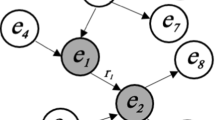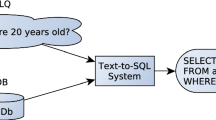Abstract
Question Answering Over Temporal Knowledge Graphs is an important topic in question answering, which aims to find an entity or timestamp to answer temporal reasoning questions from temporal knowledge graphs. Answering complex questions remains a major challenge for question answering over temporal knowledge graphs because it is associated with complex temporal reasoning. The performance of the existing state-of-the-art model falls short when the question contains constraints (e.g., ‘before/after’, ‘first/last’ and ‘during’) that require complex temporal reasoning based on multiple relevant facts. In this paper, we propose an improving reasoning method called the Complex Temporal Reasoning Network, which improves the complex temporal reasoning for temporal reasoning questions. For each question, we capture implicit temporal features and relation representation and then integrate them to generate implicit temporal relation representation. The experimental results on the CRONQUESTIONS dataset demonstrate that our method significantly outperforms all baselines. In particular, we demonstrate the effectiveness of our method on complex questions. The source code of CTRN will be available at https://github.com/2399240664/CTRN.





Similar content being viewed by others
Data Availability Statement
The data that support the findings of this study are openly available at https://github.com/apoorvumang/CronKGQA.
References
Trivedi R, Dai H, Wang Y, Song L (2017) Know-evolve: deep temporal reasoning for dynamic knowledge graphs. In: International conference on machine learning. PMLR, pp 3462–3471
Dhingra B, Cole J R, Eisenschlos J M, Gillick D, Eisenstein J, Cohen W W (2022) Time-aware language models as temporal knowledge bases. Trans Assoc Comput Ling 10:257–273. https://doi.org/10.1162/tacl_a_00459, https://arxiv.org/abs/https://direct.mit.edu/tacl/article-pdf/doi/10.1162/tacl_a_00459/2004543/tacl_a_00459.pdf
Jia Z, Abujabal A, Saha Roy R, Strötgen J, Weikum G (2018) Tequila: temporal question answering over knowledge bases. In: Proceedings of the 27th ACM international conference on information and knowledge management, CIKM ’18. https://doi.org/10.1145/3269206.3269247. Association for Computing Machinery, New York, pp 1807–1810
Jia Z, Pramanik S, Saha Roy R, Weikum G (2021) Complex temporal question answering on knowledge graphs. In: Proceedings of the 30th ACM international conference on information & knowledge management, pp 792–802
Jia Z, Abujabal A, Saha Roy R, Strötgen J, Weikum G (2018) Tempquestions: a benchmark for temporal question answering. In: Companion proceedings of the the web conference 2018, pp 1057–1062
Saxena A, Chakrabarti S, Talukdar P (2021) Question answering over temporal knowledge graphs. In: Proceedings of the 59th annual meeting of the association for computational linguistics and the 11th international joint conference on natural language processing (volume 1: long papers). https://doi.org/https://aclanthology.org/2021.acl-long.520. Association for Computational Linguistics, Online, pp 6663–6676
Lacroix T, Obozinski G, Usunier N (2020) Tensor decompositions for temporal knowledge base completion. In: 8th International conference on learning representations, ICLR 2020, Addis Ababa, Ethiopia, April 26-30, 2020. https://doi.org/https://openreview.net/forum?id=rke2P1BFwS
Vrandečić D, Krötzsch M (2014) Wikidata: a free collaborative knowledgebase. Commun ACM 57(10):78–85
Bollacker K, Evans C, Paritosh P, Sturge T, Taylor J (2008) Freebase: a collaboratively created graph database for structuring human knowledge. In: Proceedings of the 2008 ACM SIGMOD international conference on management of data, pp 1247–1250
Mitchell T, Cohen W, Hruschka E, Talukdar P, Yang B, Betteridge J, Carlson A, Dalvi B, Gardner M, Kisiel B et al (2018) Never-ending learning. Commun ACM 61(5):103–115
García-Durán A, Dumančić S, Niepert M (2018) Learning sequence encoders for temporal knowledge graph completion. In: Proceedings of the 2018 conference on empirical methods in natural language processing. https://aclanthology.org/D18-1516. Association for Computational Linguistics, Brussels, pp 4816–4821
Dasgupta S S, Ray S N, Talukdar P (2018) HyTE: hyperplane-based temporally aware knowledge graph embedding. In: Proceedings of the 2018 conference on empirical methods in natural language processing. https://aclanthology.org/D18-1225. Association for Computational Linguistics, Brussels, pp 2001–2011
Goel R, Kazemi S M, Brubaker M, Poupart P (2020) Diachronic embedding for temporal knowledge graph completion. In: Proceedings of the AAAI conference on artificial intelligence, vol 34, pp 3988–3995
Jain P, Rathi S, Mausam, Chakrabarti S (2020) Temporal knowledge base completion: new algorithms and evaluation protocols. In: Proceedings of the 2020 conference on empirical methods in natural language processing (EMNLP). https://aclanthology.org/2020.emnlp-main.305. Association for Computational Linguistics, Online, pp 3733–3747
Goel R, Kazemi S M, Brubaker M, Poupart P (2020) Diachronic embedding for temporal knowledge graph completion. In: Proceedings of the AAAI conference on artificial intelligence, vol 34, pp 3988–3995
Wang Z, Zhang J, Feng J, Chen Z (2014) Knowledge graph embedding by translating on hyperplanes. In: Proceedings of the AAAI conference on artificial intelligence, vol 28
Trouillon T, Welbl J, Riedel S, Gaussier E, Bouchard G (2016) Complex embeddings for simple link prediction. In: Balcan M F, Weinberger K Q (eds) Proceedings of the 33rd international conference on machine learning. https://proceedings.mlr.press/v48/trouillon16.html, vol 48. PMLR, New York, pp 2071–2080
Kazemi S M, Poole D (2018) Simple embedding for link prediction in knowledge graphs. Advances in Neural Information Processing Systems, 31
Sun Z, Deng Z-H, Nie J-Y, Tang J (2019) Rotate: knowledge graph embedding by relational rotation in complex space. In: 7th International conference on learning representations, ICLR 2019, New Orleans, LA, USA, May 6-9, 2019. https://openreview.net/forum?id=HkgEQnRqYQ
Balazevic I, Allen C, Hospedales T (2019) TuckER: tensor factorization for knowledge graph completion. In: Proceedings of the 2019 conference on empirical methods in natural language processing and the 9th international joint conference on natural language processing (EMNLP-IJCNLP). https://aclanthology.org/D19-1522. Association for Computational Linguistics, Hong Kong, pp 5185–5194
Miller A, Fisch A, Dodge J, Karimi A-H, Bordes A, Weston J (2016) Key-value memory networks for directly reading documents. In: Proceedings of the 2016 conference on empirical methods in natural language processing. https://aclanthology.org/D16-1147. Association for Computational Linguistics, Austin, pp 1400–1409
Sun H, Bedrax-Weiss T, Cohen W (2019) PullNet: open domain question answering with iterative retrieval on knowledge bases and text. In: Proceedings of the 2019 conference on empirical methods in natural language processing and the 9th international joint conference on natural language processing (EMNLP-IJCNLP). https://aclanthology.org/D19-1242. Association for Computational Linguistics, Hong Kong, pp 2380–2390
Cohen W W, Sun H, Hofer R A, Siegler M (2020) Scalable neural methods for reasoning with a symbolic knowledge base. In: 8th International conference on learning representations, ICLR 2020, Addis Ababa, Ethiopia, April 26-30, 2020. https://openreview.net/forum?id=BJlguT4YPr
Esposito M, Damiano E, Minutolo A, De Pietro G, Fujita H (2020) Hybrid query expansion using lexical resources and word embeddings for sentence retrieval in question answering. Inf Sci 514:88–105. https://doi.org/10.1016/j.ins.2019.12.002, https://www.sciencedirect.com/science/article/pii/S0020025519311107
He G, Lan Y, Jiang J, Zhao W X, Wen J-R (2021) Improving multi-hop knowledge base question answering by learning intermediate supervision signals. In: Proceedings of the 14th ACM international conference on web search and data mining, pp 553–561
Souza Costa T, Gottschalk S, Demidova E (2020) Event-qa: a dataset for event-centric question answering over knowledge graphs. In: Proceedings of the 29th ACM international conference on information & knowledge management, pp 3157–3164
Wu W, Zhu Z, Lu Q, Zhang D, Guo Q (2020) Introducing external knowledge to answer questions with implicit temporal constraints over knowledge base. Future Internet 12(3):45
Mavromatis C, Subramanyam P L, Ioannidis V N, Adeshina S, Howard P R, Grinberg T, Hakim N, Karypis G (2021) Tempoqr: temporal question reasoning over knowledge graphs. arXiv:2112.05785
Kipf T N, Welling M (2017) Semi-supervised classification with graph convolutional networks. In: 5th International conference on learning representations, ICLR 2017, Toulon, France, April 24-26, 2017, conference track proceedings. https://openreview.net/forum?id=SJU4ayYgl
Sun H, Dhingra B, Zaheer M, Mazaitis K, Salakhutdinov R, Cohen W (2018) Open domain question answering using early fusion of knowledge bases and text. In: Proceedings of the 2018 conference on empirical methods in natural language processing. https://aclanthology.org/D18-1455. Association for Computational Linguistics, Brussels, pp 4231–4242
Pang S, Xue Y, Yan Z, Huang W, Feng J (2021) Dynamic and multi-channel graph convolutional networks for aspect-based sentiment analysis. In: Findings of the association for computational linguistics: ACL-IJCNLP 2021, pp 2627–2636
Pota M, Esposito M, De Pietro G, Fujita H (2020) Best practices of convolutional neural networks for question classification. Appl Sci 10:14. https://doi.org/10.3390/app10144710, https://www.mdpi.com/2076-3417/10/14/4710
Févry T, Baldini Soares L, FitzGerald N, Choi E, Kwiatkowski T (2020) Entities as experts: sparse memory access with entity supervision. In: Proceedings of the 2020 conference on empirical methods in natural language processing (EMNLP). https://aclanthology.org/2020.emnlp-main.400. Association for Computational Linguistics, Online, pp 4937–4951
Sanh V, Debut L, Chaumond J, Wolf T (2019) Distilbert, a distilled version of bert: smaller, faster, cheaper and lighter. arXiv:1910.01108
Kingma D P, Ba J (2015) Adam: a method for stochastic optimization. In: Bengio Y, LeCun Y (eds) 3rd International conference on learning representations, ICLR 2015, San Diego, CA, USA, May 7-9, 2015, conference track proceedings. 1412.6980
Acknowledgements
This work was supported in part by the National Social Science Foundation under Award 19BYY076, in part Key R & D project of Shandong Province 2019 JZZY010129, in part Shandong Natural Science Foundation under Award ZR2021MF064 and Award ZR2021QG041, and in part by the Shandong Provincial Social Science Planning Project under Award 19BJCJ51.
Author information
Authors and Affiliations
Corresponding authors
Ethics declarations
We wish to confirm that there are no known conflicts of interest associated with this publication and there has been no significant financial support for this work that could have influenced its outcome.
We confirm that the manuscript has been read and approved by all named authors and that there are no other persons who satisfied the criteria for authorship but are not listed. We further confirm that the order of authors listed in the manuscript has been approved by all of us.
We confirm that we have given due consideration to the protection of intellectual property associated with this work and that there are no impediments to publication, including the timing of publication, with respect to intellectual property. In so doing we confirm that we have followed the regulations of our institutions concerning intellectual property.
We understand that the Corresponding Author is the sole contact for the Editorial process (including Editorial Manager and direct communications with the office). He/she is responsible for communicating with the other authors about progress, submissions of revisions and final approval of proofs. We confirm that we have provided a current, correct email address which is accessible by the Corresponding Author.
Additional information
Publisher’s note
Springer Nature remains neutral with regard to jurisdictional claims in published maps and institutional affiliations.
Rights and permissions
About this article
Cite this article
Jiao, S., Zhu, Z., Wu, W. et al. An improving reasoning network for complex question answering over temporal knowledge graphs. Appl Intell 53, 8195–8208 (2023). https://doi.org/10.1007/s10489-022-03913-6
Accepted:
Published:
Issue Date:
DOI: https://doi.org/10.1007/s10489-022-03913-6




